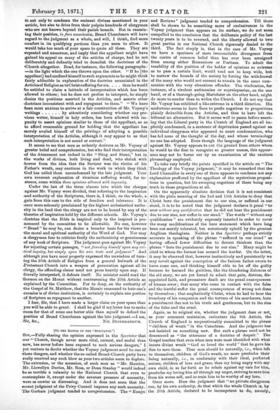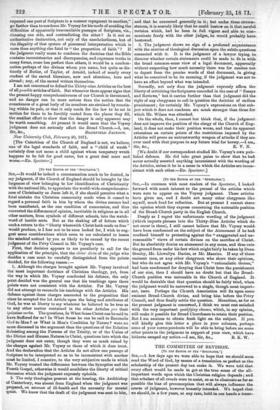[TO THE EDITOR OF THE "SPECTATOR:1
sharing the opinion expressed in the Spectator that our " Church, though never more vital, earnest, and useful than 410W, has never before been exposed to such serious dangers," I yet venture to doubt whether the Voysey judgment need be one of those dangers, and whether the so-called Broad-Church party have really received any such blow as your two articles seem to deplore. The extrusion, or the secession, of such men as "Mr. Maurice, Mr. Llewellyn Davies, Mr. Ross, or Dean Stanley " would indeed be so terrible a calamity to the National Church that even to contemplate it, except under the severest pressure of necessity, were as unwise as distressing. And it does not seem that the recent judgment of the Privy Council imposes any such necessity. The Gorham judgment tended to comprehension. The " Essays and Reviews" judgment tended to comprehension. Till there shall be shown to be something more of exclusiveness in the Voysey judgment than appears on its surface, we do not seem compelled to the conclusion that the deliberate policy of the last twenty years is to be reversed, and the liberty allowed to two great parties in our National Church rigorously denied to the third. The fact simply is, that in the case of Mr. Voyaey we have a specimen of more irreconcilable divergence from the centre of common belief than has ever been arraigned from among either Romanizers or Puritans. To admit the tenability of the position of the holder of opinions so extreme as to pass a certain limit, would tend not to keep wide, but to narrow the bounds of the society by forcing the withdrawal of the many who would not consent to remain in the same com- munion with the very obnoxious offender. The vindication, for instance, of a virulent antinomian or supralapsarian, on the one hand, or of a thorough-going Mariolater on the other hand, might do more to sunder than to widen the Church. I do not say that Mr. Voysey has exhibited a like extreme in a third direction. His misfortune seems to have seen to prefix negatives to propositions plainly deducible from the Articles, and thus to have left the tribunal no alternative. But it seems well to pause before assert- ing that the Liberal party in the Church of England are all im- plicitly condemned, in a sentence of deprivation passed against an individual clergyman who appeared to court condemnation, who has led none of the thought of the day, and whose terminology no one has adopted. Even though the language of the judgment against Mr. Voysey appears to cut the ground from others whom he would be the first to recognize as greater names, this appear- ance may not be borne out by an examination of the cautious phraseology employed.
To take very briefly the points specified in the article on " The Theology of the Voysey judgment," it may be remarked that the Lord Chancellor in every one of them appears to condemn not any explanation proffered by the appellant of the mysterious proposi- tions in question, but his sweeping negations of there being any truth in those propositions at all.
On the apparently absolute decision that it is not consistent with the plain meaning of the 2nd and 15th Articles to deny that Christ bore the punishment due to our sins, or suffered in our stead, it is to be noted that the judgment declares it penal " to aver without any qualification that he did not bear the punishment due to our sins, nor suffer in our stead." The words " without any qualification " are evidently expressly inserted in order to cover the many modifications of the bare statement which have long been not merely tolerated, but notoriously upheld by the greatest Anglican theologians. Neither is the Spectator perhaps strictly accurate in speaking of the phrase " suffered in our stead" as having offered fewer difficulties to devout thinkers than the phrase " bore the punishment due to our sins." Many might be cited to whom the former has seemed the harder. On the latter, it may be observed that, however instinctively and persistently we may revolt against the conception of the furious father sworn to harm some one, and thinking himself able to let off the guilty because he harmed the guiltless, like the blundering Zaleucus of-
the old story, we are yet forced to admit that pain, distress, dis- appointed faith, and premature death are the penal consequences of human error ; that many who come in contact with the false
and the hurtful suffer the penal consequences of wrong not done by themselves ; that emphatically Christ, when he had to bear the
treachery of his companion and the torture of his murderers, bore a punishment due not to his truth and gentleness, but to the sins of the false and the cruel.
Again, as to original sin, whether the judgment does or not, as your comment maintains, caricature the 9th Article, the Church of England is unquestionably committed to the phrase " children of wrath" in the Catechism. And the judgment has not insisted on something new. But such a phrase need not be denounced as " the utterance of a doctrine of despair." The Gospel teaches that even when men were most identified with what incurs divine wrath " God so loved the world " that he gave his
Son to save them. That men should be naturally, i.e., when left to themselves, children of God's wrath, no more precludes their being naturally, i.e , in conformity with their ideal, perfected nature, children of love and grace, than my being angry with my.- own child, in so far forth as he rebels against my care for him, precludes my loving him all through my anger, striving to save him from his worse self, and.to train him to be worthy of my love.
Once more. Does the judgment that "no private clergyman. can, by his own authority, do that which the whole Church is, by the 20th Article, declared to be incompetent to do, namely,
expound one part of Scripture in a manner repugnant to another," go farther than to condemn Mr. Voysey for his mode of avoiding the difficulties of apparently irreconcilable passages of Scripture, viz., choosing one side, and contradicting the other ? Is it not an authoritative declaration, not only of the unscholarliness, but of the illegality of that system of piecemeal interpretation which is more than anything else fatal to " the proportion of faith "? If the judgment really mean to condemn the doctrine that the Bible contains inconsistencies and discrepancies, and expresses truths in many forms, some less perfect than others, it would be a condem- nation perhaps of the divines whom you name, but quite as dis- tinctly of Butler, of Taylor, of Arnold, indeed of nearly every student of the sacred literature, now and aforetiine, here and abroad; nay, of the sacred writers themselves.
I am not concerned to defend the Thirty-nine Articles as the best of all possible articles of faith. But whenever there appear signs that the present happy comprehensiveness of our Church is threatened, and no danger can be more serious than the notion that the consciences of a great body of its members are strained by remain- ing within its pale, or that it only needs for the law to be set in motion for them to be forcibly ousted from the places they fill, the smallest effort to show that the danger is only apparent may be worth something. At present it would seem that the Voysey judgment does not seriously affect the Broad Church.—I, am,
Sir, &c., BLOMFIELD JACKSON. New University Club, February 20, 1871.
[The Catechism of the Church of England is not, we believe, one of the legal standards of faith, and a " child of wrabh " certainly does not mean a child against whom temporary wrath happens to be felt for good cause, but a great deal more and worse.—ED. Spectator.]



































 Previous page
Previous page